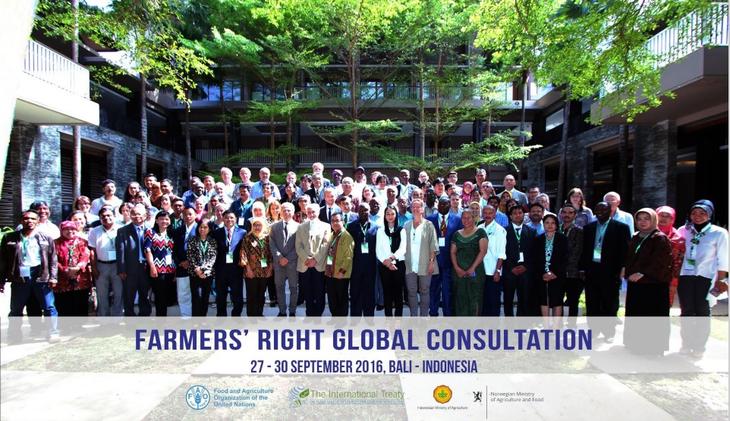
2015 – 2017: The Bali Global Consultation on Farmers’ Rights
The most important event during this biennium was the Bali Global Consultation on Farmers’ Rights. Gathering 95 participants from all regions and major stakeholder groups taking stock and discussing future action, it represented a milestone in the international work for Farmers’ Rights.
The Global Consultation on Farmers’ Rights were held 27 - 30 September 2016 at Bali in Indonesia. The objectives were to seek common grounds for the understanding Farmers' Rights, to share experiences through the exchange of best practices on their realization, and to gather ideas on how to strengthen implementation. Participants from all major stakeholder groups were present: Contracting Parties, farmers’ organizations, NGOs, intergovernmental organizations, seed industry organizations and research institutions. There were participants from all regions. The consultation was organized by the governments of Indonesia and Norway, and the Secretariat of the Plant Treaty, with financial support also from the Governments of Italy and Switzerland and some organizations.
Starting out with a field trip on the first day, the consultation went on with sessions to set the scene, on why Farmers’ Rights matter, on challenges and experiences regarding the realization of Farmers’ Rights and possible ways forwards. A wide range of presentations were made, representing a rich body of examples, experiences and views, and there was ample time for discussion. A summary of the presentations and discussions is contained in the report from the consultation (PDF).
Based on the discussions, the co-chairs of the consultation, Regine Andersen from Norway and Carlos Correa from Argentina developed a Co-chairs’ summary of recommendations to the Plant Treaty’s Governing Body. A core recommendation was to establish and ad hoc Working Group to guide and assist Contracting Parties in the implementation of Farmers’ Rights. The tasks of the ad hoc Working Group would include:
- producing an inventory of national measures that may be adopted to enhance the realization of Farmers’ Rights, including the right to save, use, exchange and sell farm-saved seed, subject to national law.
- developing, in an inclusive and participatory manner, voluntary guidelines on the realization of Farmers’ Rights at national level, having in view submissions of Contracting Parties and other stakeholders.
Further recommendations comprised measures to support the ad hoc Working Group as well as other measures directly targeted at the implementation of Farmers’ Rights at the national and international levels. The summary of recommendations can be found in the report from the consultation (PDF).
In addition to the Bali Global Consultation on Farmers’ Rights, several regional consultations, workshops and dialogues were convened during the biennium. A compete overview of these is contained in the report of the Plant Treaty Secretariat to the Governing Body for its Seventh Session (PDF) on the implementation of Farmers’ Rights.
For example, there was a Stakeholders’ Consultation for Africa, 27-29 June 2016 in Harare, Zimbabwe in preparation for the Global Consultation. The consultation was attended by 59 participants representing Contracting Parties (Angola, Cameroon, Kenya, Madagascar, Malawi, Namibia, Tanzania, Uganda, Zambia and Zimbabwe), farmers and farmers’ organizations, civil society organizations (CSOs), CGIAR, regional organizations, research institutions and academia. The results of the consultation were summarized in a Position Paper of Africa for the Global Consultation. The Consultation was organized and hosted by the Community Technology Development Trust (CTDT) and the Ministry of Agriculture Mechanization and Irrigation, supported by the Treaty Secretariat.
There was also an Informal Stakeholders’ Consultation on Farmers´ Rights in Geneva, Switzerland, on 28 May 2016 to examine the progress in and challenges to the national implementation of Article 9 of the Treaty. Also this consultation was made in preparation of the Global Consultation. It was attended by experts from ministries of agriculture, research institutions, academia and CSOs. A summary report (PDF) of the consultation highlights key results.
Furthermore, the Secretariat conducted an online survey on the implementation of Farmers’ Rights from 1 June to 15 August 2016, also as a preparation for the Global Consultation. The objective was to gather views, perceptions, options, approaches and possible strategies for implementing Farmers’ Rights. The electronic consultation had 166 respondents from a total of 58 Contracting Parties, representing government institutions, CSOs/NGOs, farmers, indigenous peoples and local communities, research and academia, intergovernmental organizations and the seed industry. The respondents found the realization of Farmers’ Rights to be fundamental for the objectives of the International Treaty, albeit constrained by a number of challenges, such as limited or lack of awareness and understanding of the concept, lack of financial support, and inadequate capacity. Further information on the results of the electronic survey is provided in a report from the Treaty Secretariat (PDF).
Another important event took place after the Global Consultation on Farmers’ Rights: A symposium on possible interrelations between the International Treaty on Plant Genetic Resources for Food and Agriculture and the International Convention for the Protection of New Varieties of Plants (UPOV Convention) was held on 16 October 2016. This symposium was a result of the request of the Treaty’s Governing Body for the Secretariat to continue engaging with UPOV and WIPO to finalize the process for identifying possible areas of interrelations among the respective instruments. The symposium was convened at the UPOV Headquarters in Geneva, Switzerland and attended by more than 140 participants, representing governments, farmers, civil society and the private sector. Details about the process leading to the symposium can be found in the Secretariat’s report to the Governing Body (PDF). The proceedings from the symposium were provided in an information document (PDF) to the Treaty’s Governing Body.